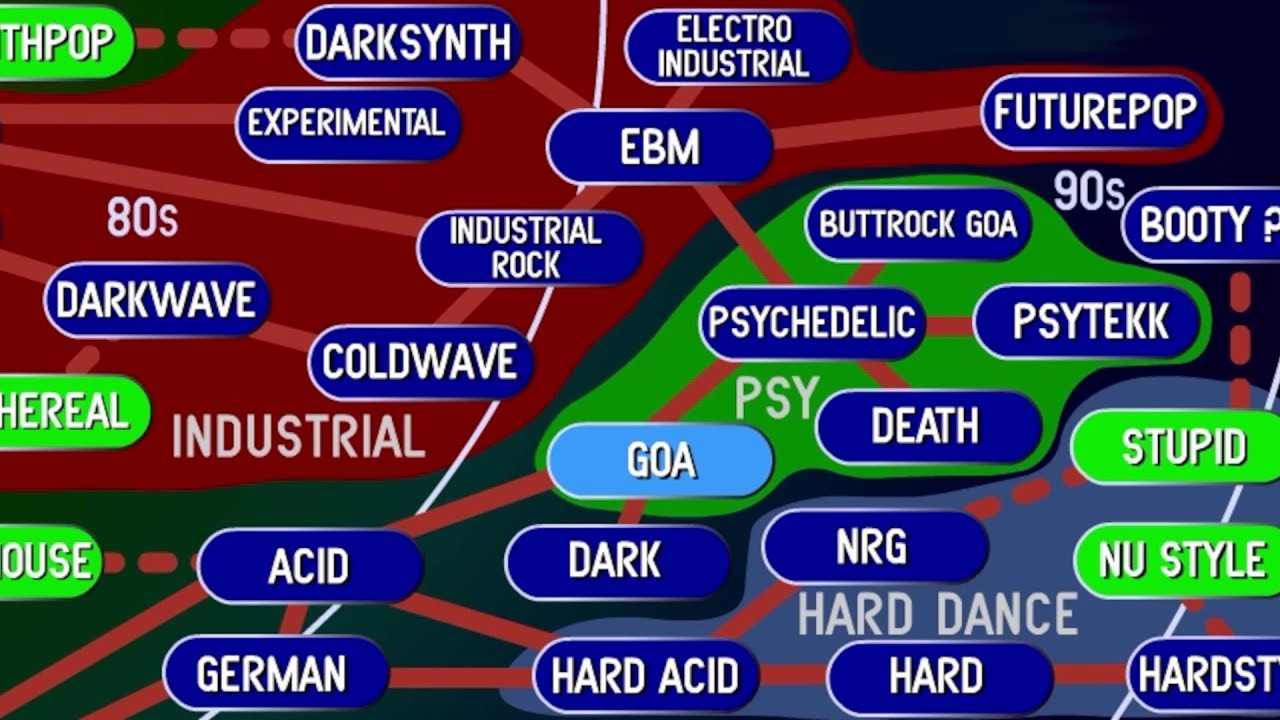
If the above image triggered a wave of memories of tinny, low bitrate samples, snarky humour and Fun Facts about a million different house subgenres and "buttrock goa", then you're probably an old millennial fart who, like me, learned most of what you know about electronic music through Ishkur and his charming Flash website. And that's why, like me, you've probably come to realise most of what you know about electronic music is wrong.
I don't remember exactly when or how I first came across the term "industrial" in a musical context, much less when or how I finally pieced together a rough idea of what it meant (I still don't have a set-in-stone definition of it, and that uncertainty is partly why the genre still holds a fascination for me). The examples Ishkur provides aren't wrong per se, but as with any attempt to reduce a genre of music that can encompass anything from Italian futurism to the fringes of hyperpop to a handful of soundbites, the selections can only tell a fraction of the story.
For my own part I can only really define a genre of music by what I've actually heard - with the caveat that I can't possibly have heard everything there is to hear, and was born a good few years after the rise and fall of Industrial Records, the first collective of artists to use "industrial" as the name of a genre. So with that in mind, here are the top five (maybe even first five?) songs that for better or for worse, shaped my taste in & understanding of this thing we call industrial music, and should hopefully give the reader a rough idea of where this blog is coming from:
-
KMFDM - A Drug Against War
This song cemented several wrong ideas I had about industrial music - but in fairness, over time it also proved to be a good marker of what industrial isn't. -
Ministry - You Know What You Are
Long before I got my head around the fact that industrial music doesn't necessarily have to be "heavy", this song at least corrected my view that heaviness automatically equalled guitars. Repeated listens over the years have brought out some of the more original and inventive features of the song such as that typewriter-slamming percussion (which was probably done on a sampler, but still). -
Skinny Puppy - VX Gas Attack
A nightmarishly graphic glimpse into real world historical horrors underpinned by a jarringly upbeat bass groove. I was completely wrongfooted by my introduction into the macabre world of Skuppy and to this day I'm undecided if I "like" their work or just find it morbidly fascinating. SP have always been too caught up in their own dark thematic and musical obsessions to gain the kind of mainstream clout that NIN and Ministry have enjoyed, while still retaining far more more accessibilty and (cult) popularity than any artist at the noisier, more experimental end of the industrial spectrum. As I'm sure is the case for many industrial fans, this was the band that bridged the gap for me, paving the way for me to discover much more out-there delights while at the same time demonstrating that songs about vivisection, chemical warfare, insanity, addiction and state violence could be catchy and danceable. -
Throbbing Gristle - Hamburger Lady
Somehow even more graphic than VX Gas Attack, this is one of the few songs in existence that disturbed me so much the first time I heard it I lost sleep over it. The lowing bass synth frequencies emulating a hospital vacuum cleaner - inverting industrial music's "found sounds" trope by using musical instruments to imitate real world industrial sounds rather than the other way round - has got to be the most chilling sonic motif in TG's discography. As I've said before, there is much, much more to Throbbing Gristle than mere shock value, but at an age where the one aspect of music I craved more than any other was the visceral thrill of having my boundaries pushed, Hamburger Lady opened the doors to a whole new world of sounds and ideas my increasingly stale CD collection couldn't match. -
Einstürzende Neubauten - Ich Bin's
Right on that sweet spot between "literally industrial sounding" and "industrial because they're taking an experimental approach to making music with found objects", Neubauten's fourth album Fünf auf der nach oben offenen Richterskala (1987) was the most baffling surprise I ever found on the "metal/heavy rock" rack at my nearest HMV. I love the idea that, nearly 20 years after it was released, there were still people out there innocently pigeonholing music like this as "metal" because of its literally metallic sound (assuming they didn't just give the German language title and track list a once-over and assume it was a Rammstein side project). This album comfortably remains in my Top 3 Neubauten albums to this day, along with the two either side of it in the chronological order of releases - for my money, Halber Mensch, ...Richterskala and Haus der Lüge form a trilogy as perfect as Ministry's Land, Mind and Psalm.